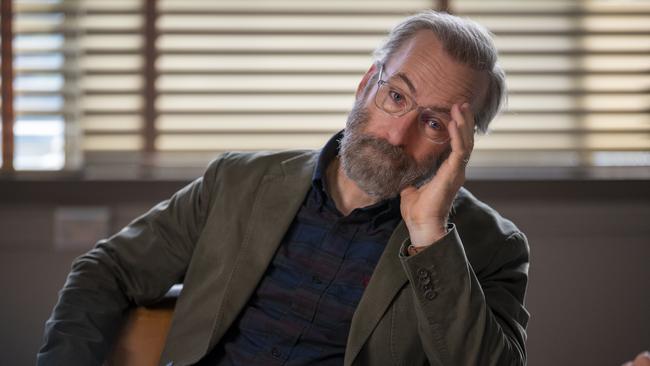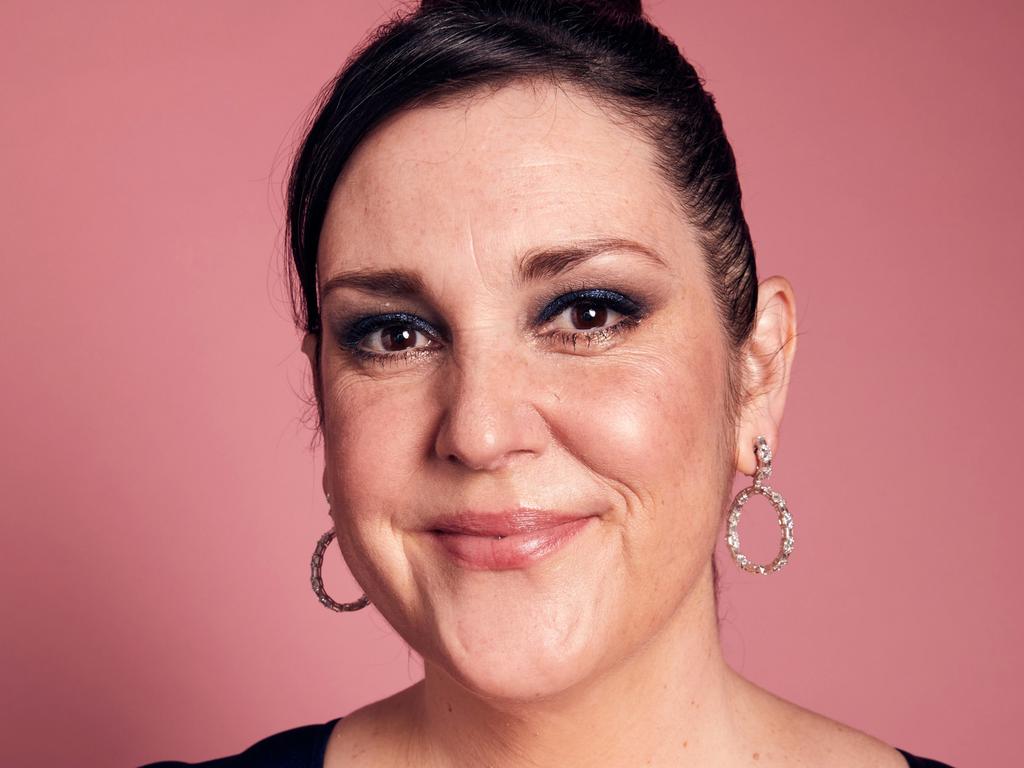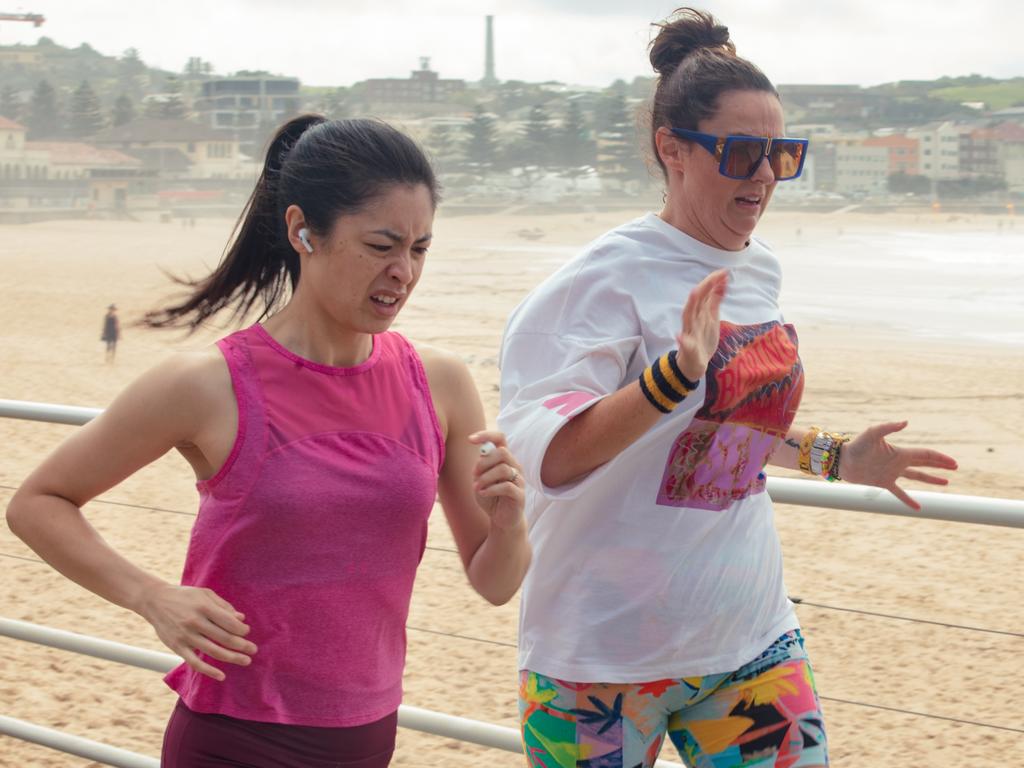Bob Odenkirk in Lucky Hank is a revelation
Quickly becoming TV’s master dissembler, Breaking Bad and Better Call Saul star Bob Odenkirk takes on another challenging role in Lucky Hank.

Lucky Hank, a sometimes-beguiling mixture of midlife crisis story, family drama, and workplace comedy, comes from creators and showrunners Paul Lieberstein and Aaron Zelman. Emmy-award winner Lieberstein made his reputation working on The Office, appearing regularly as an actor on the prestigious sitcom. And Zelman is from the world of procedural TV, with shows like Law & Order and Criminal Minds – before also getting an Emmy nomination for the highly regarded legal series Damages.
Zelman says the new show “represents the Venn diagram of our interests and writing styles and where they meet”, and they’ve pulled off a unique kind of mix which is both disarming and highly entertaining.
The series is based on Richard Russo’s 1997 novel Straight Man. Russo is an author not so well known here, but his novels about small-town American life set in disintegrating blue-collar towns are well regarded in the US. His best-known book, Empire Falls, won him the Pulitzer Prize for fiction in 2002, but 2007’s campus novel, Straight Man, is seen by critics as somewhat of an anomaly in his backlist but was enthusiastically received and reviewed.
Russo’s account of the serio-comic shenanigans of a divided and divisive provincial English department became something of a cult read; for many readers, the novel’s universe still offers what critic Tom Cox calls a “pleasingly flawed destination” and they still lap it up in some delight.
“Readers who do not laugh uncontrollably during this raucous, witty and touching work are seriously impaired,” said Publisher’s Weekly. “The novel’s greatest pleasures derive not from any blazing impatience to see what happens next, but from pitch-perfect dialogue, persuasive characterisation and a rich progression of scenes, most of them crackling with an impudent, screwball energy reminiscent of Howard Hawks’ movies,” Tom De Haven wrote in a New York Times review when the book came out.
Russo’s novel has been deftly updated by Lieberstein and Zelman in a rather dryly restrained fashion with no mention of the current culture wars raging in US universities, where in many cases inquiry and debate have degenerated into pitched battles and university governing boards are politically polarised. “One of the things that we always say is we never wanted this to be an issues show,” says Zelman. “Really, to us, it was more about following these characters and what the demands of them are in terms of how they just want to live their lives.”
Instead, they give us a sometimes mildly satirical but more often empathetic look at the petty battles between a group of middle-aged academics in a dysfunctional English department who have found they are stuck in career limbo. They’re playing out time, having gone as far as their talents will allow. Each paranoid they might get the boot regardless of tenure.
The set-up director is the accomplished Peter Farrelly (There’s Something About Mary, Green Book) who, while with his brother Bobby, has specialised in over-the-top transgressive comedy, handles Lucky Hank with a cool dexterity and nonchalant sense of compassion.
The series is centred on William Henry Devereaux, Jr – Hank, for short – a professor in the English Department at the Railton Campus of West Central Pennsylvania University, who also happens to be the department chair. He is middle-aged and married with a single daughter called Julie (Olivia Scott Welch), who always seems to need money.
His wife is Lily, the vice-principal at the Railton School, played by the delightful Mirelle Enos, an educator with a delightful line in counselling the parents of difficult students with French chocolates.
-
‘The things that I liked about this project were the character was funny and he knew he was funny, as opposed to Saul.’
-
Hank is inhabited by the inimitable and seemingly indefatigable Bob Odenkirk, who somehow takes on another demanding lead role after playing Jimmy McGill aka Saul Goodman for the past 13 years in both Breaking Bad and prequel Better Call Saul. “There’s no drugs, there’s no guns, there’s no zombies, there’s no dystopia,” Odenkirk says of why he jumped at playing Hank.
“The things that I liked about this project were the character was funny and he knew he was funny, as opposed to Saul. Saul is funny, but you laugh at him, you don’t laugh with him so much. This guy was making jokes, all the time. I loved getting to play that.”
It’s easy to forget that before he started as the shyster lawyer Jimmy McGill, Odenkirk came from comedy, both stand up and improvisation, was a writer for Saturday Night Live in the late 1980s on Late Night with Conan O’Brien and The Jerry Stiller Show. He won Emmys for writing. He also starred in the HBO sketch comedy series Mr Show from 1995 to 1998 and made recurring appearances on the legendary Larry Sanders Show as Stevie Grant, the titular star’s hyperactive agent.
“This show, to me, is 50/50 drama and comedy, which is really hard to do and rarely done,” he says of Lucky Hank. “I feel like Alexander Payne does it wonderfully, but outside of him, I don’t know who does it so well. It’s a tough thing to do because you’re either pulling back on the comedy too far, or your drama isn’t authentic because the comedy is ridiculing the drama. We’re trying to do a very hard thing.”
The shenanigans start when during a peer review session, Deveraux is snapped out of a luncheon reverie – much of the series is carried through Hank’s interior monologues – by a student called Barto Williams-Stevens. He wants serious feedback on his short story. Hank enrages the kid when he says: “I couldn’t help but note the wandering point of view, within basically structuralist sentences.”
The fight is on, driving the professor to state unequivocally that Railton is “mediocrity’s capital”, a “miserly college in a sad begotten town”, and where this kid belongs. His tirade, taped by another student, ends up in the school newspaper and all hell breaks loose for Hank, his professorship suddenly up for grabs, his colleagues voting on his future.
“The firing squad,” he ruminates as they consider their position. “They never send one person, it’s always a squad. It’s a group effort; makes it more of a bonding event, live lions ripping apart a scared gazelle, a pride, good times.”
The casting, agreeably diverse, is terrific here, the workplace humour nicely malicious. There’s Suzanne Cryer’s pompous feminist poetry professor Gracie, a self-published poet; Cedric Yarborough’s cutting Paul Rourke and Shannon DeVido’s voluble, scatty Emma Wheemer, the film-studies teacher dismissed by her colleagues as “a projectionist”.
But things get even worse for Hank when he discovers William Henry Devereaux Sr, a worldwide respected writer and critic, decides to retire after more than 40 years, the two having not spoken in over a decade. The old man deciding he wants to spend more time with his family after some unaccountable number of marriages.
The series is beautifully set-up and controlled by Odenkirk’s performance.
And he certainly is a fascinating, if initially not entirely likeable, character. He is brilliantly played by Odenkirk in his flannel Oxford shirts, worn with crumpled insouciance, all tweed sportscoats, leather satchel casually thrown over the shoulder and those plastic-rimmed glasses.
There’s something about him that’s just too contained; it’s a condescending balance of confidence and barbed self-awareness. He’s cool, and above it all, the real person hiding behind the wisecracks and the barbed jokes.
But there’s an empty look at times on his as though he sees through what’s happening around him with a deep sadness. Pushing 50, his life has little meaning. His one novel, published 20 years ago, got good reviews but didn’t sell.
“Haven’t we all figured out what the advertising industry learned ages ago? That after age 49 we aren’t changing our minds about anything?” he tells a friend. Things are set in the firmament, Hank Devereaux’s choices have been made, his career path set, and now that he has tenure and the role of Department Chair, he can never be fired. Or so he thinks. He just must deal with entitled college students who think they’re the next Hemingway or, God forbid, the next Chaucer.
He is after all, as he suggests, living and working in an ecosystem that creates and encourages mediocrity. Hank has entered a mid-life crisis without quite realising it.
“Who isn’t miserable,” he tells his wife. “Being an adult is 80 per cent misery.” Later, in one of his many reflective thoughts delivered in those musing voiceovers, he questions why we have become so obsessed with happiness: “Whatever happened to just getting through the day?”
Odenkirk is TV’s master dissembler, vanishing into his roles but somehow always recognisably himself, unmistakeable and inimitable. His acting is like choreography, placing movement in the camera’s frame with a kind of visceral energy.
Watch his hands in any shot, they hold the performance together, shaping and holding moments, moulding them into focus. It’s as if though now hundreds of hours in character, in all sorts of settings, he’s broken through some sort of actor’s sound barrier. Totally at home with both comedic and dramatic extremes, the work is as easy as breathing.
Lucky Hank is streaming on Stan








To join the conversation, please log in. Don't have an account? Register
Join the conversation, you are commenting as Logout